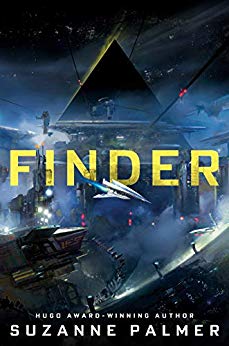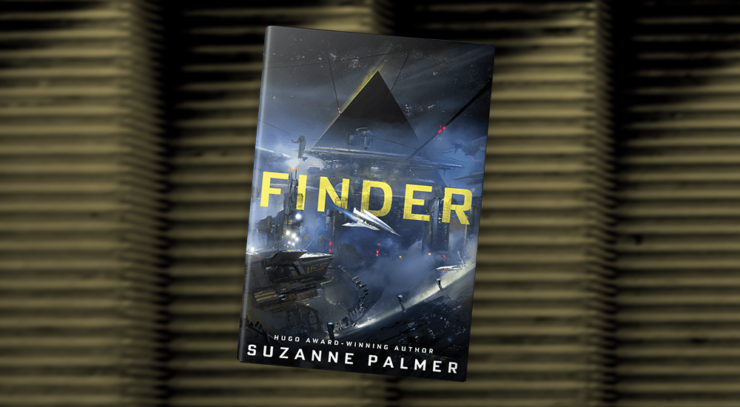From Ian Fleming’s James Bond to Poul Anderson’s Dominic Flandry, there is a pleasantly episodic feel to the sort of story that drops an adaptable agent into a situation where they’re charged with getting the goods/prize/bounty/whatever before riding out to the next mission. (See also: The Doctor.) But reality is often messier, especially when the agent in question starts to meddle in affairs and get involved, despite their training and better judgment. Especially if the agent is typically a loner, like con-artist/repo man Fergus Ferguson, star of Suzanne Palmer’s Finder.
Fergus’ relatively straightforward contract—to repossess a stolen spacecraft from one Arum Gilger—goes wrong right from the beginning, as he is caught in the assassination of Mother Vahn, a longtime foe of Gilger. Things are complicated further as Mari, a member of the Vahn clan, subsequently attaches herself to his quest, although Fergus really does not want any such entanglements. Fergus soon learns that Cernee’s solar system is a mess of factions, politics, entities, and powers on the brink of conflict—and his efforts to complete his mission are more like an accelerant than a damper to this war.
And then there are the aliens. Powerful, mysterious aliens called the Asiig have occasionally buzzed by the system, and the Vahn clan seems to have had a past with them. Fergus’ arrival in Cernee seems to herald their return, and with a seemingly more long-term agenda this time. The aliens’ presence unnerves everyone, and adds an additional factor of instability and chaos to the rapidly disintegrating situation. They eventually become more important to the plot, and Fergus’ life, than just a MacGuffin, but they always remain rather mysterious in motive, if not positively capricious.
Fergus himself is a fascinating main character, a person who isn’t entirely sure of who and what he is himself (which doesn’t help when he comes into contact with the Asiig at last), but who is determined to do the job he has been given, come what may. He is a Roguish sort of hero, a clever loner who wants to think and scheme his way to his goals. Trickery and deception, as well-befits a con-man/repo man, are his strengths and modus operandi. Part of his story in Finder, however, is learning that while entanglements are ostensibly an unwanted encumbrance to his job and vocation, they are a necessary part of being human. Fergus discovers, for good and ill, the consequences and knock-on effects of meddling.
The cast and world created around him is colorful, inventive, and a solidly and excellently constructed locale for set pieces and adventure. Cernee is a solar system of rocks, habitats, and space stations in loose associations with each other. Travel between the various locales is accomplished by transport both public (such as the cable car which opens the novel) and private (the small pogostick-like spacecraft called flysticks). This disjointed solar system allows for a variety of widely different locales and set pieces, from lichen farms to Bil’s Bugrot Firebowl restaurant (I want a t-shirt!). Each area feels unique, and different, and yet in a loose connection with entities near and far. There are plenty of corners that Fergus runs into on his repossession quest and the inventiveness of the Cernee system is well assured.
Buy the Book


Finder
The writing’s excellent. The distilled strength of Palmer’s shorter work puts her in good stead here, with excellent dialogue and character interactions, and a vivid economical approach to her description and evocations. More than that, the novel has much to say about people, and their conceptions of themselves, and what others think of them. Amid the adventure and action and character beats, the novel has a lot to say about the overlapping but non-congruent senses of who people are, and the conception that other people have of them.
There is a portion that I am not certain entirely works. At one point Fergus makes a side trip out of the system entirely, all the way to Mars. While the motivations and the reasons for the side trip make sense, and it provides a solid dollop of character building for Fergus by putting him in an environment where he really knows the terrain, the mechanics of getting there and back is not satisfactorily explained. Sure, there is plenty of FTL in this universe and its mechanics are not the point of this novel, but springing Fergus so easily when everyone else in Cernee is caught in the conflict feels somehow off. For all it does good for character development, it weakens the plot of the novel to have the side quest. The improbability of his trip gets a handwaved mention when he returns but I think it releases the pressure cooker that Fergus has been under to this point a tad too much for the novel’s own good.
The cover of this novel was a strong factor in making me pick this up, in addition to Palmer’s short fiction portfolio. The novel, I think, lives up to the thematic, if not the exact elements of the gorgeous cover design. Mysterious aliens, interesting and very sticky characters, strong worldbuilding of a complex solar system, and very strong writing mark Finder as an excellent jump for Palmer from her award winning short fiction into the world of novels. This is a big universe we’ve barely gotten a look at, I would be much inclined to see more of the many corners of it.
Finder is available from DAW.
Book cover © DAW; Background image by XoMEoX. Modified from original under CC BY 2.0 license.
An ex-pat New Yorker living in Minnesota, Paul Weimer has been reading sci-fi and fantasy for over 30 years. An avid and enthusiastic amateur photographer, blogger and podcaster, Paul primarily contributes to the Skiffy and Fanty Show as blogger and podcaster, and the SFF Audio podcast. If you’ve spent any time reading about SFF online, you’ve probably read one of his blog comments or tweets (he’s @PrinceJvstin).










